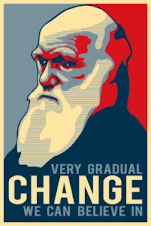I love Carl Sagan. I think every scientist has to read the Varieties of the Scientific Experience. After all, we should be asking, why do we do science at all and what can we gain? Sagan is an awesome science communicator.
Anyway, everybody has to check out Cosmos, his TV show series. Its now available on Hulu. Enjoy.
Monday, April 13, 2009
Thursday, April 9, 2009
Bacteria rule the World and Reasons why people dont care!!!
Bacteria World!!! And they say scientists cant be pretty, articulate, and not boring. At the moment, we're socialized in a way that does not promote scientific interest and thinking.
And these are possibilities as to why.
And these are possibilities as to why.
Scientists need to take the hard Line!!!
I take the hard line. No excuses for superstitions and myths. Yes, religion and science are mutually exclusive faculties. Any scientist who wants to merge them are delusional.
Dawkins isnt as bad as people think.
He just tells the truth. Boohoo.
I doubt that religion can survive deep understanding. The shallows are its natural habitat. Cranks and fundamentalists are too often victimised as scapegoats for religion in general. It is only quite recently that Christianity reinvented itself in non-fundamentalist guise, and Islam has yet to do so (see Ibn Warraq's excellent book, Why I am not a Muslim). Moonies and scientologists get a bad press, but they just haven't been around as long as the accepted religions. Theology is a respectable discipline when it studies such subjects as moral philosophy, the psychology of religious belief and, above all, biblical history and literature. Like Bertie Wooster, my knowledge of the Bible is above average. I seem to know Ecclesiastes and the Song of Solomon almost by heart. I think that the Bible as literature should be a compulsory part of the national curriculum - you can't understand English literature and culture without it. But insofar as theology studies the nature of the divine, it will earn the right to be taken seriously when it provides the slightest, smallest smidgen of a reason for believing in the existence of the divine. Meanwhile, we should devote as much time to studying serious theology as we devote to studying serious fairies and serious unicorns.
-Richard Dawkins
Queerer Than We Can Suppose?
At least, according to Dawkins!
The universe is queerer than we can suppose. Hell yeah. There are so many mysteries in science. One of them is quantum physics. Under quantum physics(and my understanding), several universes can be postulated, which is an odd concept...especially to me, an amateur biologist.
Another complication with quantum physics(again to my understanding) is that the observer can influence the outcome of the experiment. Whoa!!! Can that mean there are limits to experimentation? There is a grain of truth as one cross disciplines. Biologists who do research in the Galapagos bring foreign bacteria which can affect the very ecosystem they are studying. Ethnographer's presence in a culture may influence how individuals act. So is ethnography really portaying actual behavior in that culture? Some cool things to think about!
The universe is queerer than we can suppose. Hell yeah. There are so many mysteries in science. One of them is quantum physics. Under quantum physics(and my understanding), several universes can be postulated, which is an odd concept...especially to me, an amateur biologist.
Another complication with quantum physics(again to my understanding) is that the observer can influence the outcome of the experiment. Whoa!!! Can that mean there are limits to experimentation? There is a grain of truth as one cross disciplines. Biologists who do research in the Galapagos bring foreign bacteria which can affect the very ecosystem they are studying. Ethnographer's presence in a culture may influence how individuals act. So is ethnography really portaying actual behavior in that culture? Some cool things to think about!
Saturday, April 4, 2009
Epigenetics.
Interesting.
Epigenetics refers to mitotically and/or meiotically heritable variations in gene expression that are not caused by changes in DNA sequence. Epigenetic mechanisms regulate all biological processes from conception to death, including genome reprogramming during early embryogenesis and gametogenesis, cell differentiation and maintenance of a committed lineage. Key epigenetic players are DNA methylation and histone post-translational modifications, which interplay with each other, with regulatory proteins and with non-coding RNAs, to remodel chromatin into domains such as euchromatin, constitutive or facultative heterochromatin and to achieve nuclear compartmentalization. Besides epigenetic mechanisms such as imprinting, chromosome X inactivation or mitotic bookmarking which establish heritable states, other rapid and transient mechanisms, such as histone H3 phosphorylation, allow cells to respond and adapt to environmental stimuli. However, these epigenetic marks can also have long-term effects, for example in learning and memory formation or in cancer. Erroneous epigenetic marks are responsible for a whole gamut of diseases including diseases evident at birth or infancy or diseases becoming symptomatic later in life. Moreover, although epigenetic marks are deposited early in development, adaptations occurring through life can lead to diseases and cancer. With epigenetic marks being reversible, research has started to focus on epigenetic therapy which has had encouraging success. As we witness an explosion of knowledge in the field of epigenetics, we are forced to revisit our dogma. For example, recent studies challenge the idea that DNA methylation is irreversible. Further, research on Rett syndrome has revealed an unforeseen role for methyl-CpG-binding protein 2 (MeCP2) in neurons.
Subscribe to:
Posts (Atom)
